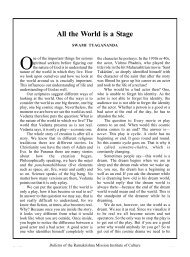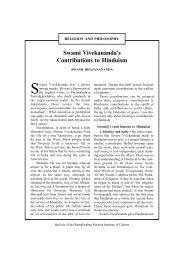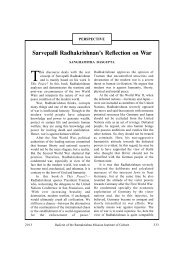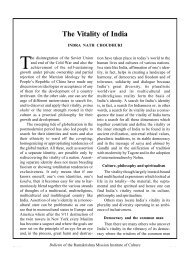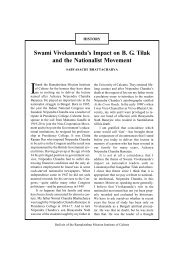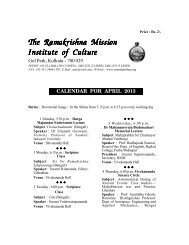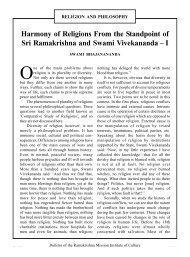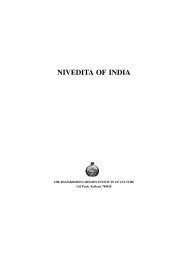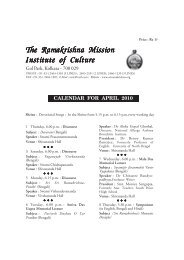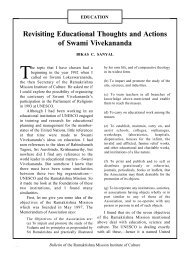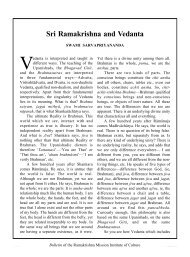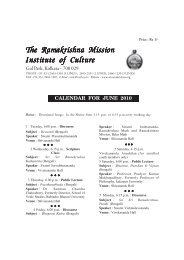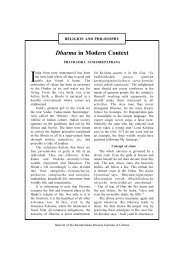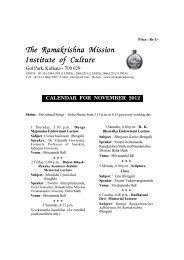Human Rights and Social Justice - Ramakrishna Mission Institute of ...
Human Rights and Social Justice - Ramakrishna Mission Institute of ...
Human Rights and Social Justice - Ramakrishna Mission Institute of ...
Create successful ePaper yourself
Turn your PDF publications into a flip-book with our unique Google optimized e-Paper software.
BIKAS C SANYAL<br />
HUMAN RIGHTS<br />
<strong>Human</strong> <strong>Rights</strong> <strong>and</strong> <strong>Social</strong> <strong>Justice</strong>:<br />
International Context<br />
BIKAS C SANYAL<br />
Ishall talk about ‘<strong>Human</strong> <strong>Rights</strong>’ in the<br />
context <strong>of</strong> the present international political,<br />
economic <strong>and</strong> financial crises. I shall<br />
discuss the role <strong>of</strong> international organizations<br />
like UNESCO in building a universal culture<br />
<strong>of</strong> peace <strong>and</strong> human rights. This role should<br />
guarantee the implementation <strong>of</strong> human<br />
rights, within the Organization’s m<strong>and</strong>ate, <strong>of</strong><br />
the most vulnerable group <strong>of</strong> populations. I<br />
shall also take into consideration the emerging<br />
ethical <strong>and</strong> social challenges. The diverse<br />
socio-economic, political <strong>and</strong> cultural background<br />
<strong>of</strong> different countries, <strong>of</strong> course,<br />
makes it a challenging task. But I shall try.<br />
Let me first dwell on the historical context<br />
<strong>of</strong> <strong>Human</strong> <strong>Rights</strong> <strong>and</strong> <strong>Social</strong> <strong>Justice</strong>.<br />
Frankly speaking, the aspiration for <strong>and</strong> provision<br />
<strong>of</strong> human rights for social justice has<br />
been recorded for thous<strong>and</strong>s <strong>of</strong> years in Asia<br />
<strong>and</strong> abroad. Asia, however, was the first. Emperor<br />
Cyrus <strong>of</strong> Persia (598-529 BC) is recognized<br />
as the first promoter <strong>of</strong> human rights in<br />
sixth century BC. This information is found in<br />
the ‘Cyrus Cylinder’. Then comes Emperor<br />
Asoka <strong>of</strong> India (265-232 BC). That he established<br />
the Law <strong>of</strong> Piety (<strong>Human</strong> <strong>Rights</strong>) is<br />
found in his Edicts. Then, again, the Islamic<br />
Prophet Muhammad instituted the rights <strong>and</strong><br />
responsibilities <strong>of</strong> the Muslim, Jewish <strong>and</strong><br />
other communities including the Pagan communities<br />
for living together <strong>and</strong> promoting<br />
religious freedom <strong>and</strong> security <strong>of</strong> women in<br />
the Constitution <strong>of</strong> Medina (622 AD).<br />
From the 17th to the first quarter <strong>of</strong> the<br />
20th century, the following instruments were<br />
constructed in the West, namely, the British<br />
Bill <strong>of</strong> <strong>Rights</strong> (1689), The US Virginia Declaration<br />
<strong>of</strong> <strong>Rights</strong> (1776), The French Declaration<br />
<strong>of</strong> the <strong>Rights</strong> <strong>of</strong> Man <strong>and</strong> <strong>of</strong> the Citizens<br />
(1789), The International <strong>Human</strong>itarian Law:<br />
the Law <strong>of</strong> Geneva (1864 <strong>and</strong> 1949), the Law<br />
<strong>of</strong> Hague (1899 <strong>and</strong> 1907), <strong>and</strong> the League <strong>of</strong><br />
Nations established in 1919 for promoting<br />
many aspects <strong>of</strong> human rights. The International<br />
Federation <strong>of</strong> <strong>Human</strong> <strong>Rights</strong> was established<br />
in 1922 with 10 national organizations.<br />
Today it comprises 155 centres in more than<br />
100 countries.<br />
The most important event <strong>of</strong> modern<br />
times for protection <strong>of</strong> human rights was The<br />
Universal Declaration <strong>of</strong> <strong>Human</strong> <strong>Rights</strong><br />
(UDHR) <strong>of</strong> the United Nations adopted in<br />
1948 with 30 articles: articles 3-21 dealing<br />
with civil <strong>and</strong> political rights, 22-28 with economic,<br />
social <strong>and</strong> cultural rights. The UDHR<br />
was drafted by people from different cultures<br />
<strong>and</strong> traditions, including a US Roman Catholic,<br />
a Chinese Confucian philosopher, a<br />
French Zionist, a representative from the<br />
Arab League <strong>and</strong> drawing upon advice from<br />
thinkers such as Mahatma G<strong>and</strong>hi, the father<br />
<strong>of</strong> Indian nation.<br />
The promulgation at the international<br />
level <strong>of</strong> laws <strong>and</strong> treaties that followed may be<br />
mentioned here. The principal <strong>of</strong> these are the<br />
<strong>Human</strong> <strong>Rights</strong> Law (1966) leading to the<br />
International Covenant on Civil <strong>and</strong> Political<br />
<strong>Rights</strong> (1966) <strong>and</strong> International Covenant<br />
on Economic, <strong>Social</strong> <strong>and</strong> Cultural <strong>Rights</strong><br />
(1966); Convention on Elimination <strong>of</strong> All<br />
Forms <strong>of</strong> Racial Discrimination (CERD,<br />
adopted 1966, enforced 1969); Convention<br />
312 Bulletin <strong>of</strong> the <strong>Ramakrishna</strong> <strong>Mission</strong> <strong>Institute</strong> <strong>of</strong> Culture<br />
June
HUMAN RIGHTS AND SOCIAL JUSTICE: INTERNATIONAL CONTEXT<br />
on the Elimination <strong>of</strong> All Forms <strong>of</strong> Discrimination<br />
Against Women (CEDAW, enforced<br />
1981); United Nations Convention Against<br />
Torture (CAT, adopted <strong>and</strong> enforced 1984);<br />
Convention on the <strong>Rights</strong> <strong>of</strong> the Child (CRC,<br />
adopted <strong>and</strong> enforced 1989); International<br />
Convention on the Protection <strong>of</strong> the <strong>Rights</strong> <strong>of</strong><br />
All Migrant Workers <strong>and</strong> Members <strong>of</strong> their<br />
Families (ICRMW, adopted 1990, enforced<br />
2003). The Optional Protocol to the International<br />
Covenant <strong>of</strong> Economic, <strong>Social</strong> <strong>and</strong> Cultural<br />
<strong>Rights</strong> adopted by UN General Assembly<br />
in December 2008 strengthened the justifiability<br />
<strong>of</strong> the rights to work, health, education,<br />
housing, culture, gender equality, decent<br />
life <strong>and</strong> human dignity.<br />
<strong>Human</strong> <strong>Rights</strong> <strong>and</strong> <strong>Social</strong><br />
<strong>Justice</strong> in Asia<br />
Independence movements <strong>of</strong> the Asian<br />
countries under colonial rule advocated selfdetermination<br />
<strong>and</strong> human rights (During<br />
Japanese war the Chinese Communist Party<br />
enacted human rights ordinances in liberated<br />
areas, to give one example).<br />
After independence all the Asian states<br />
naturally adopted constitutions with human<br />
rights clauses. However, after independence<br />
when the fighters became the new rulers, selfdetermination,<br />
nationalism <strong>and</strong> national integration<br />
were emphasized in some countries<br />
rather than human rights. The ideas <strong>of</strong> ‘Asian<br />
culture’ <strong>and</strong> ‘Asian values’ emerged.<br />
The concept <strong>of</strong> ‘Asian values’ wanted to<br />
give more importance to ‘economic, social<br />
<strong>and</strong> cultural rights’ than to ‘civil <strong>and</strong> political<br />
rights’. However, the Vienna Declaration <strong>and</strong><br />
Programme <strong>of</strong> Action adopted by the World<br />
conference on <strong>Human</strong> <strong>Rights</strong> in 1993 rejected<br />
the application <strong>of</strong> concepts <strong>of</strong> ‘Asian culture’<br />
<strong>and</strong> ‘Asian values’ <strong>and</strong> asserted that ‘All<br />
human rights are universal, indivisible <strong>and</strong><br />
interdependent <strong>and</strong> interrelated’ <strong>and</strong> ‘The<br />
World Conference on <strong>Human</strong> <strong>Rights</strong> reaffirms<br />
the importance <strong>of</strong> ensuring the universality,<br />
objectivity <strong>and</strong> non-selectivity <strong>of</strong> the<br />
consideration <strong>of</strong> human rights issues’ (Paras 5<br />
<strong>and</strong> 32, Section I, (declaration). However, the<br />
progress leaves much to be desired.<br />
<strong>Human</strong> <strong>Rights</strong> Record in South Asia,<br />
World Report 2009 <strong>of</strong> <strong>Human</strong><br />
<strong>Rights</strong> Watch<br />
The Report finds all countries violating<br />
human rights in some form or other. A study<br />
founded by ‘Save the Children-Swedish<br />
Branch’ <strong>and</strong> published by the Asian Centre<br />
for <strong>Human</strong> <strong>Rights</strong> gives the results <strong>of</strong> a survey<br />
on the situation in respect <strong>of</strong> nine rights from<br />
a comparative point <strong>of</strong> view in South Asia.<br />
The Table below gives the result:<br />
South Asia <strong>Human</strong> <strong>Rights</strong> Index 2008<br />
(Asian Centre for <strong>Human</strong> <strong>Rights</strong>, August 2008)<br />
Country<br />
Sri Bangladesh<br />
Bhutan Pakistan Maldives Nepal India<br />
Lanka<br />
Rank 1 2 3 4 5 6 7<br />
<strong>Rights</strong><br />
Political<br />
Freedom<br />
4 7 6 5 3 2 1<br />
<strong>Rights</strong> to<br />
Life<br />
7 6 2 5 1 3 4<br />
Admin.<br />
<strong>of</strong> <strong>Justice</strong><br />
4 6 7 1 5 3 2<br />
NHRIS 4 6 7 5 2 3 1<br />
Press<br />
Freedom<br />
6 5 7 4 3 2 1<br />
Women 6 4 1 7 3 2 5<br />
<strong>Rights</strong> <strong>of</strong><br />
Child<br />
7 2 1 6 3 5 4<br />
<strong>Human</strong><br />
<strong>Rights</strong> 7 5 6 4 2 1 3<br />
Defenders<br />
Minorities 7 5 6 4 - 3 2<br />
Total 52 46 43 41 23 24 23<br />
• NHRIS: National <strong>Human</strong> <strong>Rights</strong><br />
Institutions; Rank 7 for having worst human<br />
rights, 1 for having best human rights.<br />
One could note that India <strong>and</strong> Maldives<br />
are in the best position whereas Sri Lanka is in<br />
the worst position. <strong>Human</strong> rights records are<br />
now being taken seriously, asserting or attempting<br />
to demonstrate adherence to international<br />
human rights norms (See White Papers<br />
from China on the topic, especially National<br />
Plan <strong>of</strong> Action for <strong>Human</strong> <strong>Rights</strong>, China,<br />
2011 Bulletin <strong>of</strong> the <strong>Ramakrishna</strong> <strong>Mission</strong> <strong>Institute</strong> <strong>of</strong> Culture<br />
313
BIKAS C SANYAL<br />
2009-2010). Significant progress has<br />
been made since UDHR as has been noted by<br />
the Amnesty International in its report <strong>of</strong><br />
2009 on the Asia-Pacific region as follows:<br />
‘Under the increasing political <strong>and</strong> economic<br />
pressure, many people in the Asia-Pacific<br />
region turned the international human rights<br />
framework to bolster their efforts to secure<br />
greater dignity for themselves <strong>and</strong> others’<br />
(Asia <strong>and</strong> the Pacific, Amnesty International<br />
Report 2009, page 5).<br />
Challenges facing Asia in the current<br />
context <strong>of</strong> global economic <strong>and</strong><br />
financial crisis<br />
The challenges spawned by unregulated<br />
globalization, especially in the social <strong>and</strong><br />
ethical domain, are mainly the following:<br />
• <strong>Social</strong> exploitation by the dominant private<br />
sector <strong>and</strong> multinationals <strong>and</strong> reduced<br />
emphasis on state role in education, health<br />
<strong>and</strong> social service;<br />
• Privatization <strong>of</strong> public services leading<br />
to deprivation <strong>of</strong> the poor <strong>and</strong> the<br />
marginalized;<br />
• Excessive consumerism causing environmental<br />
disaster (pollution, climate change<br />
leading to water shortages <strong>and</strong> degradation <strong>of</strong><br />
l<strong>and</strong> on the one h<strong>and</strong>, <strong>and</strong> floods, raising <strong>of</strong><br />
sea-level <strong>and</strong> loss <strong>of</strong> habitable l<strong>and</strong> on the<br />
other), corruption <strong>and</strong> marginalization;<br />
• Underinvestment in agriculture, emphasis<br />
on mining, manufacturing, communication,<br />
financial <strong>and</strong> trade sectors;<br />
• Deprivation <strong>of</strong> the indigenous people <strong>of</strong><br />
their l<strong>and</strong> <strong>and</strong> natural resources;<br />
• Inequality among social groups<br />
(women, rural people, migrant workers, ethnic<br />
<strong>and</strong> religious minorities) disturbing peace,<br />
creating conflicts, religious fundamentalism<br />
<strong>and</strong> terrorism.<br />
The current financial crisis due to<br />
unregulated opening up <strong>of</strong> the economy for<br />
globalization in its turn has led to poverty<br />
aggravated by reduction in development assistance,<br />
repatriation <strong>of</strong> migrant workers from<br />
export-driven economies <strong>and</strong> drastic reduction<br />
<strong>of</strong> foreign remittances, unemployment<br />
due to slowing down <strong>of</strong> economies, food crisis,<br />
politically manipulated distribution <strong>of</strong><br />
food aid <strong>and</strong> negligence <strong>of</strong> education <strong>and</strong><br />
health care <strong>and</strong> cut in social security with no<br />
safety nets.<br />
The above factors are responsible for political<br />
instability <strong>and</strong> mass violence which has<br />
led to media censorship <strong>and</strong> restrictions on<br />
civil society in certain countries as Irene Khan<br />
in her report on Amnesty International (2009)<br />
has noted. I quote:<br />
Deprivation, inequality, injustice, insecurity<br />
<strong>and</strong> oppression are the hallmarks <strong>of</strong> poverty.<br />
They are clearly human rights problems <strong>and</strong><br />
will not yield to economic measures alone.<br />
They dem<strong>and</strong> strong political will <strong>and</strong> a comprehensive<br />
response integrating political,<br />
economic, social <strong>and</strong> environmental<br />
issues with an overarching framework <strong>of</strong><br />
human rights <strong>and</strong> the rule <strong>of</strong> law.<br />
Suggested role <strong>of</strong> UNESCO <strong>and</strong> hints<br />
for implementation with<br />
sectors responsible<br />
UNESCO should continue its efforts to<br />
integrate human rights approach to all its<br />
programmes. These should cover all rights<br />
relevant to education, science, social science,<br />
culture <strong>and</strong> communications sectors <strong>of</strong><br />
UNESCO. The work it is doing through seminars,<br />
conferences, workshops etc. (See for<br />
example, UNESCO’s Work on Education for<br />
Peace <strong>and</strong> Non-Violence, on <strong>Human</strong> <strong>Rights</strong><br />
<strong>and</strong> related topics providing a list <strong>of</strong> 23 recent<br />
publications: UNESCO, 2003-2008) should<br />
be continued, updated <strong>and</strong> oriented towards<br />
action as hinted below. It should continue<br />
taking special responsibility with regard to<br />
the following rights <strong>and</strong> programmes:<br />
• Right to education (including moral <strong>and</strong><br />
ethical education, peace education <strong>and</strong> education<br />
for democracy; human rights education;<br />
environmental education as integral part <strong>of</strong><br />
formal, non-formal <strong>and</strong> informal education,<br />
314 Bulletin <strong>of</strong> the <strong>Ramakrishna</strong> <strong>Mission</strong> <strong>Institute</strong> <strong>of</strong> Culture<br />
June
HUMAN RIGHTS AND SOCIAL JUSTICE: INTERNATIONAL CONTEXT<br />
entrepreneurial education <strong>and</strong> bioethics)<br />
(Sector responsible: Education)<br />
• Right to participate in cultural life (protection<br />
<strong>of</strong> cultural diversity <strong>and</strong> cultural property)<br />
<strong>and</strong> the rights <strong>of</strong> intellectuals (Sector<br />
responsible: Culture)<br />
• Right to freedom <strong>of</strong> opinion <strong>and</strong> expression<br />
including right to seek, receive <strong>and</strong> impart<br />
information using modern technology<br />
(web site, internet etc.) (Sector responsible:<br />
Communication)<br />
• Right to enjoy the benefits <strong>of</strong> scientific<br />
progress <strong>and</strong> its applications including access<br />
to digital forms <strong>of</strong> knowledge (Sector responsible:<br />
Science)<br />
• Right <strong>of</strong> women: (Responsible: All<br />
sectors)<br />
• Adoption <strong>of</strong> st<strong>and</strong>ard-setting instruments<br />
for accountability <strong>of</strong> potential violators<br />
including corporations <strong>and</strong> improving them in<br />
areas <strong>of</strong> UNESCO’s m<strong>and</strong>ate <strong>and</strong> development<br />
<strong>of</strong> their effective monitoring mechanism<br />
(Responsible: All sectors)<br />
• Promotion <strong>of</strong> research <strong>and</strong> dissemination<br />
<strong>of</strong> knowledge through workshop, orientation<br />
seminars, conferences etc. on human<br />
rights in all aspects relevant to UNESCO with<br />
special emphasis on empowerment <strong>of</strong> potential<br />
victims <strong>of</strong> human rights violation <strong>and</strong><br />
enlightenment <strong>of</strong> potential human rights violators<br />
(business, military, ideological <strong>and</strong> religious<br />
extremists etc.) <strong>and</strong> continuous updating<br />
<strong>of</strong> the competences <strong>of</strong> the protectors <strong>of</strong><br />
human rights (civil servants, lawyers, politicians,<br />
NGOs <strong>and</strong> UNESCO staff) with development<br />
<strong>of</strong> concrete plans <strong>of</strong> action: (Responsible:<br />
All sectors especially, <strong>Social</strong> science;<br />
the <strong>Social</strong> Science sector’s support for the<br />
recently introduced programme on International<br />
Underst<strong>and</strong>ing for <strong>Human</strong> Unity in this<br />
<strong>Institute</strong> is a good example)<br />
• Strengthening partnerships with other<br />
UN bodies, especially Office <strong>of</strong> the High<br />
Commissioner for <strong>Human</strong> <strong>Rights</strong>, intergovernmental<br />
organizations, regional bodies, <strong>and</strong><br />
national authorities <strong>and</strong> human rights<br />
institutions, UNESCO National Commissions<br />
<strong>and</strong>, most importantly, with private sector<br />
including ‘philanthropreneurs’ for funding<br />
human rights protection programmes (All<br />
sectors)<br />
• Co-ordinating the action plans <strong>of</strong><br />
different sectors <strong>of</strong> the organization<br />
• Maintaining rationally allocated budget<br />
for implementation <strong>of</strong> the programmes <strong>and</strong><br />
facilitating mobilization <strong>of</strong> extra-budgetary<br />
resources.<br />
• Lastly, UNESCO should appreciate that<br />
success in the implementation <strong>of</strong> UDHR will<br />
depend on the national authorities. External<br />
imposition can backfire. Focus should be on<br />
the ‘conscientization’ <strong>of</strong> people through the<br />
programmes mentioned above.<br />
Enabling factors<br />
Political pluralism <strong>and</strong> participatory democracy<br />
are institutional foundations necessary<br />
for protection <strong>of</strong> human rights in all its<br />
aspects but not sufficient as will be observed<br />
from the following examples. India, during its<br />
history became the ‘home’ in chronological<br />
order <strong>of</strong> the following people:<br />
• People who settled on the bank <strong>of</strong> the<br />
river ‘Indus’ whom the Persians <strong>and</strong> Arabs<br />
later gave the name ‘Hindus’ (second millennium<br />
BC)<br />
• The Buddhists <strong>and</strong> the Jains (6th century<br />
BC) <strong>and</strong> the Jews (2nd century BC)<br />
• The Christians (Ist century AD) following<br />
St Thomas who arrived first<br />
• The Persians <strong>and</strong> the Zoroastrians (end<br />
<strong>of</strong> 7th century AD) <strong>and</strong> the Moslems (8th<br />
century AD)<br />
The French Noble laureate Romain<br />
Roll<strong>and</strong> said: ‘If there is one place on the face<br />
<strong>of</strong> the earth where all the dreams <strong>of</strong> living men<br />
have found a home from the earliest days<br />
when man began the dream <strong>of</strong> existence, it is<br />
India.’ The country’s constitution provides<br />
political pluralism <strong>and</strong> participatory democracy<br />
<strong>and</strong> has incorporated <strong>and</strong> continuously<br />
updated almost all the important elements <strong>of</strong><br />
2011 Bulletin <strong>of</strong> the <strong>Ramakrishna</strong> <strong>Mission</strong> <strong>Institute</strong> <strong>of</strong> Culture<br />
315
BIKAS C SANYAL<br />
UDHR <strong>and</strong> the attached instruments in the<br />
constitution.<br />
The country has as the head <strong>of</strong> state a<br />
woman, as head <strong>of</strong> the ruling party a woman<br />
from a minority community, as head <strong>of</strong> the<br />
Parliament a woman from the lowest class <strong>of</strong><br />
the society (‘dalit’), as head <strong>of</strong> government a<br />
man from a minority community, as head <strong>of</strong><br />
defence also one from a minority community.<br />
This has not happened by chance but through<br />
the strength <strong>of</strong> its democratic institutions.<br />
Even then, the country has human rights problems.<br />
We must not lose sight <strong>of</strong> the importance<br />
<strong>of</strong> the UDHR <strong>and</strong> should constantly<br />
struggle to protect them.<br />
Impact <strong>of</strong> Swami Vivekan<strong>and</strong>a on human<br />
rights on the constitutional interpretation<br />
by the Supreme Court <strong>of</strong> India<br />
The Supreme Court has used<br />
Vivekan<strong>and</strong>a to interpret the Right to Equality<br />
<strong>and</strong> reservation for the Scheduled Castes<br />
in Akhil Bharatiya Soshit Karamchari Sangh<br />
(Rly.) v. Union <strong>of</strong> India by <strong>Justice</strong> Krishna<br />
Iyer (1981). The Court has also quoted<br />
Vivekan<strong>and</strong>a to justify the reservation given<br />
to Scheduled Castes in State <strong>of</strong> Karnataka v.<br />
Appa Balu Ingale (1995) as well as to justify<br />
the reservation policy <strong>of</strong> Other Backward<br />
Castes (OBCs) in the most famous Indra<br />
Sawhney v. Union <strong>of</strong> India (1992). The Court<br />
has used it for the purpose <strong>of</strong> interpreting the<br />
definition <strong>of</strong> what Education is under the<br />
Right to Education in P. A. Inamdar v. State<br />
<strong>of</strong> Maharashtra (2005).<br />
The Court has also used Swamiji’s philosophy<br />
to enunciate the need <strong>of</strong> the courts to<br />
be sensitive to injustice in Balbir Kaur v. Steel<br />
Authority <strong>of</strong> India <strong>and</strong> on the rights <strong>and</strong> duties<br />
<strong>of</strong> teachers in Avinash Nagra v. Navodaya<br />
Vidyalaya Samiti as indeed the nature <strong>and</strong><br />
meaning, responsibility <strong>of</strong> being a citizen <strong>of</strong><br />
India <strong>and</strong> the duties <strong>of</strong> those in government in<br />
Scheduled Castes <strong>and</strong> Scheduled Tribes Officers<br />
Welfare Council v. State <strong>of</strong> U.P. (1997).<br />
The Court has relied on Swami<br />
Vivekan<strong>and</strong>a to define <strong>Social</strong>ism in the constitution<br />
<strong>and</strong> the Welfare State <strong>and</strong> its inspiration<br />
in Murlidhar Day<strong>and</strong>eo Kesekar v.<br />
Vishwanath P<strong>and</strong>u Barde <strong>and</strong> Dharwad Dist.<br />
Literate Daily Wages Employees Association<br />
v. State <strong>of</strong> Karnataka (1990).<br />
A quote from Vivekan<strong>and</strong>a was also the<br />
first line in the famous judgement <strong>of</strong> <strong>Justice</strong><br />
Verma in Ismael Faruqui v. Union <strong>of</strong> India<br />
(also known as the Babri Masjid Judgement).<br />
In fact, the quote about Swami<br />
Vivekan<strong>and</strong>a <strong>and</strong> Mahatma G<strong>and</strong>hi being<br />
great Hindus while their teachings <strong>and</strong> life<br />
being example <strong>of</strong> great tolerance made out<br />
famously in S. R. Bommai v. Union <strong>of</strong> India,<br />
so as to define the conception <strong>of</strong> Secularism<br />
in India, being not antithetical to religion but<br />
<strong>of</strong> tolerance, is now an <strong>of</strong>t-quoted, almost<br />
legal principle, by the Court (1994). The presence<br />
<strong>of</strong> Swami Vivekan<strong>and</strong>a in the interpretation<br />
<strong>of</strong> the Constitution is surprisingly large<br />
for a person who died in the year 1902, nearly<br />
45 years before India achieved its<br />
independence, <strong>and</strong> nearly 48 years before the<br />
Constitution was brought into effect <strong>and</strong><br />
India became a Republic.<br />
The rights are too important to ignore.<br />
The goals are to be kept as they are <strong>and</strong> even<br />
exp<strong>and</strong>ed if the situation dem<strong>and</strong>s. Concerned<br />
citizens, institutions, governments <strong>and</strong><br />
UNESCO have to move forward to achieve<br />
them. The path is very difficult like walking<br />
on the edge <strong>of</strong> a razor. But UNESCO must<br />
pursue its noble mission with renewed vigour<br />
‘in building a universal culture <strong>of</strong> peace <strong>and</strong><br />
human rights’.<br />
•<br />
* Mr Bikas C Sanyal is Vice-Chairman, UNESCO International <strong>Institute</strong> for Capacity-Building in<br />
Africa, formerly Special Adviser <strong>of</strong> UNESCO Director General for Higher Education. This<br />
article is based on the text <strong>of</strong> his lecture delivered at the <strong>Institute</strong> on 3 January this year.<br />
316 Bulletin <strong>of</strong> the <strong>Ramakrishna</strong> <strong>Mission</strong> <strong>Institute</strong> <strong>of</strong> Culture<br />
June



